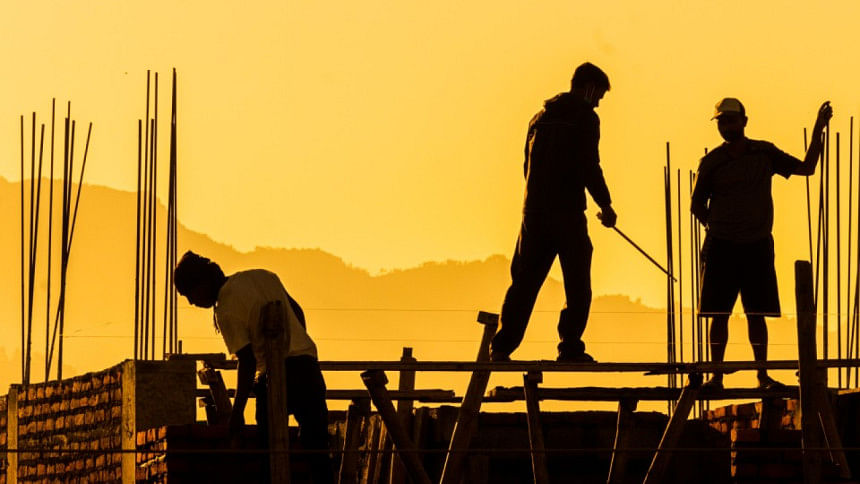We need to protect our migrant workers before it's too late

The plight of Bangladeshi migrant workers remains marred with hardship, exploitation, and tragedy, as reflected in the record-breaking 4,813 dead bodies repatriated in 2024. Behind this staggering number lies a grim reality: young lives extinguished far too soon, leaving behind grieving families and communities. These deaths are not isolated incidents but part of a broader narrative of systemic neglect and exploitation that continues to plague the lives of these labourers.
For decades, Bangladeshi workers have been the backbone of labour markets across the Gulf and Southeast Asia, often enduring grueling conditions with little to no support. They live in substandard accommodations, face unsafe workplaces, and remain under relentless pressure to recoup the exorbitant costs they incurred to migrate. This pressure drives many to work excessive hours, often at the expense of their health and well-being. As a result, heart attacks, strokes, and other stress-related ailments are commonly cited as causes of death in official records. However, these death certificates rarely tell the full story.
An in-depth look into their lives reveals the physical and mental toll of their circumstances. Long hours under harsh conditions, combined with poor nutrition and limited access to healthcare, create a perfect storm of vulnerability. Many of these workers also face abusive treatment, psychosocial stress, and chronic health risks like hypertension and kidney disease, as highlighted in the 2022 report by the Vital Signs Partnership. Yet, the causes of these deaths remain "effectively unexplained," buried under layers of bureaucratic indifference and systemic failure.
Adding to their woes is the exploitation they endure at the hands of recruitment agencies and middlemen. Many workers are cheated and abandoned, left to navigate foreign lands without the promised support or resources. They invest their life savings, often by selling assets or taking out loans, only to find themselves trapped in cycles of debt and exploitation. In such a dire situation, their untimely deaths are not just a personal loss but a devastating blow to their families, who depend on their remittances for survival.
Addressing this crisis requires urgent and coordinated action from multiple stakeholders. The Ministry of Expatriates' Welfare and Overseas Employment and the Ministry of Foreign Affairs must work together to establish robust monitoring mechanisms for migrant workers. This includes ensuring workplace safety, improving accommodation standards, and providing regular health check-ups. A proactive approach could save countless lives by identifying and addressing risks before they escalate.
Bangladeshi missions abroad also have a critical role to play. They must act as advocates for the rights and welfare of migrant workers, ensuring that their grievances are heard and addressed. This involves collaborating with host countries to enforce labour laws and holding employers accountable for mistreatment or unsafe conditions. Missions should also offer support services, including counseling and legal assistance, to help workers navigate challenges in unfamiliar environments.
Furthermore, there needs to be greater investment in pre-departure training programmes that prepare workers for the realities of migration. These programmes should include health awareness campaigns, financial literacy training, and information on workers' rights. Such initiatives could empower migrants to better protect themselves and make informed decisions about their lives abroad.
As a nation, Bangladesh owes its migrant workers more than mere acknowledgment of their remittances. They are the unsung heroes of our economy, and their sacrifices deserve respect and protection. Behind every number in the repatriation statistics is a human story -- of dreams, resilience, and heartbreak. The government, civil society, and international community must come together to ensure that these stories no longer end in tragedy.
Hasan Meer is a journalist at The Daily Star

 For all latest news, follow The Daily Star's Google News channel.
For all latest news, follow The Daily Star's Google News channel. 








Comments